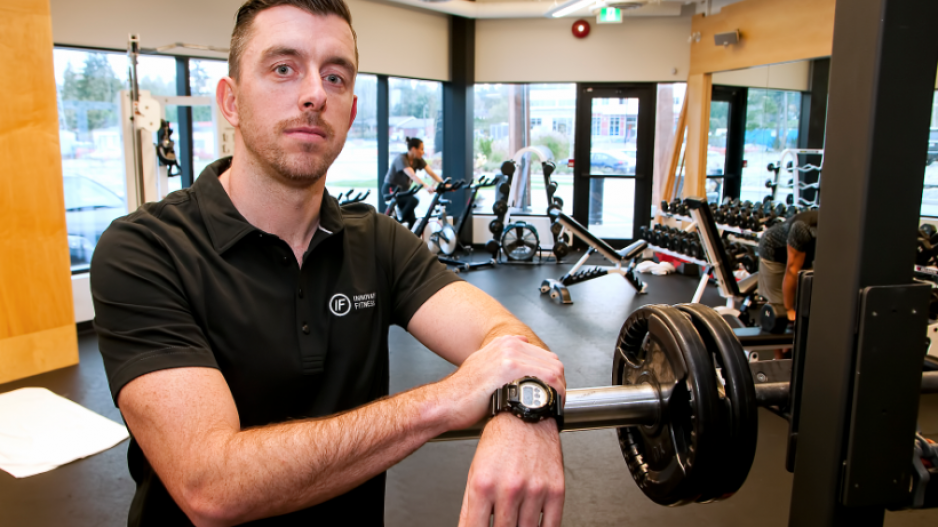Licensed B.C. fitness instructors are working in an increasingly unregulated market as the median age continues to climb and proactive health measures become more of a priority, according to one of the industry’s leaders.
Curtis Christopherson, principal of Innovative Fitness White Rock and a certified fitness instructor, said the fitness industry lacks sufficient oversight and many like him are worried the problem is growing. Unlicensed fitness instructors are holding boot camps in parks, hosting stationary cycle groups or running CrossFit gyms, but the industry has no government body to oversee accreditation or set out and enforce regulations.
“What we find is there are a lot of people out there who are not accredited or they don’t have any type of certifications or education,” said Christopherson, who holds a bachelor of kinesiology from Simon Fraser University, has been working in the industry for 18 years and was recently named Business Person of the Year by the Surrey Board of Trade. “They might look the part and think they know what they’re doing, but they don’t.”
Christopherson said the range of accreditation bodies makes it tough for customers to distinguish between a reliable fitness instructor and someone who breezed through a basic course years ago and never had to complete continued education to keep their accreditation, or simply works out a lot and looks the part.
Four accreditation bodies including the American Council on Exercise, the National Academy of Sports Medicine, the National Strength and Conditioning Association and the British Columbia Recreation and Parks Association (BCRPA) offer various levels of education, accreditation and job titles with various levels of upkeep, if any.
“There’s no accountability,” Christopherson said. “Once you get the certificate there’s no one ensuring that you are fulfilling your education credits that you have to fulfil on a regular basis to maintain that, to ensure best practice.”
Kristy Anderson, director of media relations for the Ministry of Health, noted there are 26 regulated health professions in the province. All but one of them are self-regulating professions governed by 22 regulatory colleges under the Health Professions Act (HPA).
“Government is not, at this time, considering adding any new self-regulating colleges beyond those that were identified in the Safe Choices report,” she said via email to Business in Vancouver. The government’s Health Professions Council report, released in 2001, looked at whether certain professions such as dentistry or chiropractic care need specific accreditation under the HPA. Fitness instructors were not mentioned in the report.
“In addition, current government policy supports the development of regulatory colleges formed by coalitions or groups of similar or related health-care professionals, rather than by single professions,” Anderson said.
Holly-Anne Burrows, communications and member relations manager for the BCRPA, acknowledged the fitness industry is unregulated via an email response to Business in Vancouver, noting there are about 5,000 “registered fitness leaders” across a wide range of job titles including group fitness, aquatic fitness, Pilates fitness, yoga fitness, weight training, personal training, older adult and Osteofit.
“This certainly leaves clients vulnerable to misleading claims, unsafe practices and abuses of trust,” Burrows said. “However, it is not the Wild West, since there is a national practice standard registration in place that requires fitness leaders’ competency to be examined and maintained through continued education credits.”
Burrows noted the BCRPA, which is a member of the National Fitness Leadership Alliance, does have a fitness program – the Registry of Fitness Professionals – that allows potential clients to search credentials and registration data.
“In the absence of any ‘official’ government regulatory body, the people of B.C. do have a safe and reliable place to turn to access qualified fitness professionals who have met the highest standards available within the province, and provide safe and effective services.”
Christopherson said the best route is to continue to push to have fitness instructors added to extended health-care insurance plans, which should force the government to create an oversight body to ensure best practices.
He said the issue is only going to grow as baby boomers enter retirement, because an unlicensed and unregulated industry could lead to more injuries.
“A lot of times people evaluate their personal training experience by the person’s personality,” he said. “So there are plenty of times they tell me they went to a personal trainer and said, ‘I loved them because they’re so nice or so engaging or motivating’ – not [because they were] well informed or well educated or that they understand the mechanics of the body.”
Christopherson added that with so many accreditation bodies, standard of sevice varies widely from person to person.
“There’s a big gap between your low-level certified trainer, let alone someone not certified, up to the high-level certified trainer. Unfortunately that’s the problem – people usually just go via referrals.”
@BIVnews



